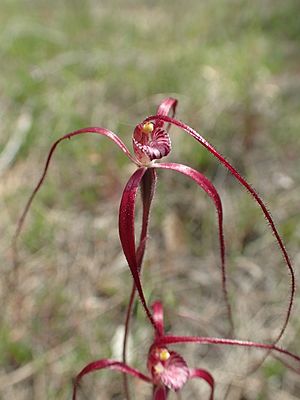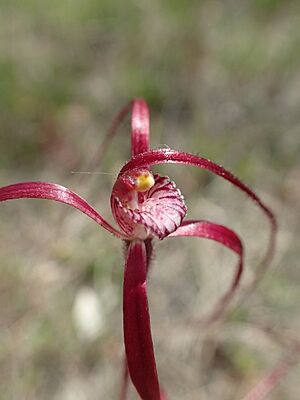Slender spider orchid facts for kids
Quick facts for kids Slender spider orchid |
|
|---|---|
 |
|
| Caladenia pulchra growing near Jerramungup | |
| Scientific classification | |
| Genus: |
Caladenia
|
| Species: |
pulchra
|
| Synonyms | |
|
|
The Caladenia pulchra, also known as the slender spider orchid, is a special type of orchid. It grows only in the south-west part of Western Australia. This plant has one tall, hairy leaf. It also grows up to three colorful flowers. These flowers can be red, yellow, and white. The amount of each color can be different from one flower to another.
Contents
What Does the Slender Spider Orchid Look Like?
The slender spider orchid is a plant that grows from the ground. It is a perennial herb, meaning it lives for more than two years. It has a special underground part called a tuber, which helps it store food. Each plant has one upright, hairy leaf. This leaf is usually about 60 to 150 millimeters (2.4 to 5.9 inches) long. It is also about 4 millimeters (0.16 inches) wide.
The Unique Flowers of the Orchid
The orchid produces up to three flowers on a single stem. This stem can be 200 to 400 millimeters (7.9 to 15.7 inches) tall. Each flower is quite large, measuring 80 to 150 millimeters (3.1 to 5.9 inches) long. They are also 40 to 100 millimeters (1.6 to 3.9 inches) wide. The flowers can be a mix of red, white, and yellow. Sometimes, they are even completely red.
The sepals, which are like outer leaves of the flower, have long, brown, thin tips. The top sepal stands straight up. It is 60 to 100 millimeters (2.4 to 3.9 inches) long. The side sepals and petals are similar in size. They start out flat, then bend downwards.
The Labellum: A Special Part of the Flower
The labellum is a unique part of the orchid flower. It is about 8 to 11 millimeters (0.31 to 0.43 inches) long. It is also 5 to 8 millimeters (0.20 to 0.31 inches) wide. The labellum is cream-colored and has red lines and marks. Its sides have short, blunt teeth. The very tip of the labellum curls under. There are also two rows of anvil-shaped bumps called calli along its middle.
When Does the Slender Spider Orchid Bloom?
These beautiful orchids usually flower from August to early October. However, they only bloom after there has been enough rain. This means they need good rainfall to grow their flowers.
How Was the Slender Spider Orchid Named?
The Caladenia pulchra was first officially described in 2001. Two scientists, Stephen Hopper and Andrew Phillip Brown, described it. They found a sample of the plant near Jerramungup. Their description was published in a science journal called Nuytsia.
The name pulchra comes from a Latin word. It means "beautiful." This name was chosen because the orchid has such delicate and pretty flowers.
Where Does the Slender Spider Orchid Live?
The slender spider orchid grows in Western Australia. You can find it between Jerramungup and Pithara. It lives in several different natural areas. These include the Avon Wheatbelt, Esperance Plains, Jarrah Forest, and Mallee regions. It often grows under thick sheoak trees. It also likes to grow near other similar trees close to small, temporary streams.
Protecting the Slender Spider Orchid
The Western Australian Government's Department of Parks and Wildlife has looked at the slender spider orchid. They have classified it as "not threatened." This means that, for now, there are enough of these plants, and they are not in danger of disappearing.


